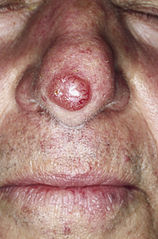
08 Aug Study Doubles Number of Genes Linked to Squamous and Basal Cell Skin Cancer
MedicalResearch.com Interview with:

Upekha Liyanage
Upekha Liyanage MBBS | PhD Student
School of Medicine | University of Queensland
Statistical Genetics Laboratory
QIMR Berghofer Medical Research Institute
MedicalResearch.com: What is the background for this study? What types of skin cancers are linked to these genes?
Response: Basal cell carcinoma (BCC) and squamous cell carcinoma (SCC) collectively referred to as “keratinocyte cancers” are the commonest forms of cancers of the skin. Although these cancers are less aggressive than melanoma, due to their large numbers, they pose a significant burden to the healthcare expenditure. Also, these cancers are relatively understudied when compared with melanoma. Notably, BCC and SCC are not routinely reported in cancer registries. In Australia, Medicare data are used to estimate the incidence and costs associated with these cancers. Expenditure in Australia for the diagnosis, treatment and pathology, almost exceeds $700 million for both BCC and squamous cell carcinoma. In Unites States, the average annual cost for skin cancer including melanoma is approximately $8.1 billion.
Previous research has led to identification of 29 BCC and 11 squamous cell carcinoma genetic risk variants and 7 of them overlap with both BCC and SCC risk. So, to strengthen the preventive efforts and to reveal new therapeutics, it is very timely and critical to explore more on the genetic susceptibility of these deadly cancers. We analysed ~48,000 cancer cases with ~630,000 skin cancer free controls from European ancestry population in Australia, UK and USA.
MedicalResearch.com: What are the main findings?
Response: Our study is the world’s largest genetic study on keratinocyte cancers to date. In total we identified total of 79 independent genetic loci associated with keratinocyte cancer risk. In total 45 new genetic associations were found. Some of these variants are exclusive to either BCC risk or squamous cell carcinoma risk, but many are associated with both. We further explored the functional pathways and noticed that some of the new loci are associated with pigmentation whilst others showed association with autoimmune traits. Notably, it is exciting to see that there is a great potential of using some of our newly discovered variants as drug targets to assist in developing the future cancer therapies or for repurposing.
Some of these targets are currently in use as cancer treatments, as an example CTLA4 antibodies as melanoma immunotherapy (ipilimumab) and ITGB6 is a target for intetumumab for prostate adenocarcinoma. This is still ground work and there is a long way to go as in identifying molecular pathways and in clinical trials until we see the benefits.
MedicalResearch.com: What should readers take away from your report?
Response: In our genetic analysis, most of the previously known variants associated with the BCC and SCC risk act via pigmentation phenotypes. This reconfirms the role of ultraviolet radiation and pigmentation traits in the aetiology of skin cancer. Still, skin cancer is preventable with making modifications to our behaviour. Specially people with fair skin should be more cautious while in the sun. It is far easier to wear sun screen, sun protective clothing in everyday life than being diagnosed with skin cancer and facing serious consequences at a later stage. Also, on a positive note more and more interesting research is coming in near future to find a cure for these cancers.
MedicalResearch.com: What recommendations do you have for future research as a result of this work?
Response: Our study has doubled the number genetic variants associated with keratinocyte cancers. Now it is the time for other researchers to focus on the functional annotations of our newly identified risk variants. Understanding the function of the implicated genes may inform development of new treatments. While surgery is the conventional management approach for majority of keratinocyte cancers it would be exciting to investigate how immunotherapy can be used for the keratinocyte cancer treatments, specially for the patients who present with advanced stage disease or who have multiple lesions. Future gene identification studies may also look at combining data from autoimmune traits with those data on skin cancer.
MedicalResearch.com: Is there anything else you would like to add?
Response: This research was funded by the Australian National Health and Medical Research Council. As the lead researcher I would like to specially mention A/Prof. Stuart Macgregor, Prof. David Whiteman (Senior Authors of the study) A/Prof. Matthew Law and everyone else who directly and indirectly involved in the study. Special appreciation will go to the study participants of UKBB, QSkin, 23andMe and eMERGE. It would be impossible to present this new exciting science without them.
Citation:
Hum Mol Genet. 2019 Jun 7. pii: ddz121. doi: 10.1093/hmg/ddz121. [Epub ahead of print]
Combined analysis of keratinocyte cancers identifies novel genome-wide loci.
Liyanage UE1, Law MH1, Han X1, An J1, Ong JS1, Gharahkhani P1, Gordon S2, Neale RE3, Olsen CM4,5, MacGregor S1, Whiteman DC4.
[wysija_form id=”3″]
[last-modified]
The information on MedicalResearch.com is provided for educational purposes only, and is in no way intended to diagnose, cure, or treat any medical or other condition. Always seek the advice of your physician or other qualified health and ask your doctor any questions you may have regarding a medical condition. In addition to all other limitations and disclaimers in this agreement, service provider and its third party providers disclaim any liability or loss in connection with the content provided on this website.
Last Updated on August 8, 2019 by Marie Benz MD FAAD
